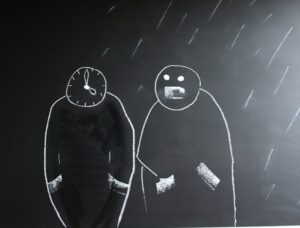Exploring the Legal Temporalities of the Covid-19 Pandemic - How do lockdown laws contribute to people's experiences of making and marking time during the pandemic? How have people sensed and felt law as part of these shifts?

We are exploring how lockdown laws contributed to people’s experiences of making and marking time during the pandemic, and how people sensed and felt law as part of these shifts. We use the term “lockdown laws” inclusively to encompass both formal and ‘everyday’ law, legislation and legal consciousness alike (Ewick and Silbey 1998). Formal lockdown law includes the Public Health (Control of Diseases) Act 1984 (PHCDA) and the Coronavirus Act 2020 (CVA), as well as many sets of regulations putting these Acts into effect. It includes restrictions on movement, travel, gatherings, the requirements to self-isolate and/or wear a mask, deriving from the PHCDA (Barber et al 2021). It also includes temporary wider powers and restrictions found in the CVA, for example closing schools and nurseries, reducing care and support, and postponing subnational elections (Lock et al 2021; Cowan 2021).
In line with well-established literatures on legal consciousness and ‘atmospheres of law’ (Philippopoulos-Mihalopoulos 2013; Gill et al 2021), we are interested as much in how people lived, interpreted, and oriented themselves in relation to law during lockdown – the atmospheres, personal rhythms and temporal patterns that arose alongside new restrictions, for example – as the statutes and regulations that cascaded into effect. Resonating with what Dave Cowan and Ann Mumford have termed “pandemic legalities” (Cowan and Mumford 2021), this approach recognises the power, oddities, and failures of the ‘formal laws’ of lockdown as well as these laws’ capacity to be augmented, re-interpreted, or used strategically in everyday life through an array of behaviours, tactics, concepts, and beliefs that contribute to a wider interpretation of law. Our research is also guided by openness to law’s affective dimensions, its capacity to help conjure experiences and cultural sensibilities, as well as an attention to the material inequalities that lockdown laws both supported and embedded.
With this in mind, we are analysing the Mass Observation diaries to understand the making of legal temporalities in everyday life during the pandemic: How did people make time(s) through the ways that they lived and enacted lockdown law? Did they change their daily routines in relation to a specific government announcement? Did they feel confused about what the law required them to do; whether they could go outdoors more than once, for example? Did they monitor other people’s daily activities? How did they feel about the law, and its abilities to contain and keep pace with the pandemic itself? In exploring these questions we hope that our research will contribute to wider work in socio-legal studies and other disciplines assessing the lived experience of law, as well as bringing an appreciation of law to ongoing debates on the making of time.

